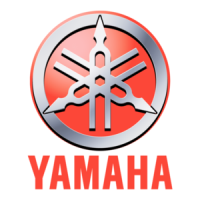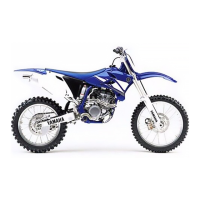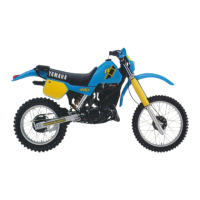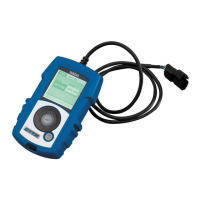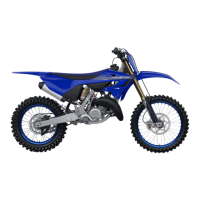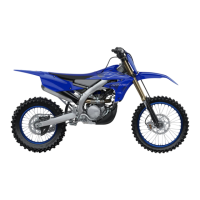Do you have a question about the Yamaha YZ 2023 Series and is the answer not in the manual?
Crucial safety precautions and guidelines for operating the vehicle safely and correctly. Essential for rider safety.
Identifies the location of key labels on the vehicle that provide important operational and safety information.
Provides an overview of the vehicle's components and their functions, with numbered diagrams.
Explains the importance of vehicle identification numbers for parts ordering and theft recovery.
Lists and describes the parts included with the vehicle, such as tools and accessories.
Covers essential notes for preparation, replacement parts, and handling of specific components during service.
Details on handling electrical components, battery connection, and basic service procedures.
Lists and illustrates special tools required for accurate adjustment and assembly, with part numbers.
Explains the function of various instruments and controls on the vehicle, including warning lights and switches.
Provides procedures for starting the engine (cold and warm) and essential break-in procedures for new vehicles.
Outlines critical maintenance tasks to be performed after the break-in period for optimal performance.
Specifies critical tightening torques for various fasteners to ensure structural integrity and safety.
Provides guidelines for cleaning, maintaining, and storing the motorcycle to preserve its condition and longevity.
Lists key dimensions, weight, and riding capacity of the vehicle.
Details engine performance parameters, fuel, oil, cooling system, and spark plug specifications.
Provides specifications for the chassis, wheels, tires, brakes, and suspension systems.
Details electrical system components, including voltage, ignition, charging, and battery specifications.
Lists general and specific tightening torques for various fasteners to ensure proper assembly and safety.
Illustrates the correct routing of cables and wires throughout the vehicle's frame and engine.
Provides a schedule for regular maintenance tasks based on mileage or time intervals.
Lists essential checks to perform before operating the vehicle to ensure it is in good condition.
Covers checks and adjustments for engine components like valve clearance, oil level, and spark plugs.
Details checks and adjustments for chassis components including brakes, wheels, tires, and suspension.
Covers checks and procedures related to the vehicle's electrical system, battery, and fuses.
Procedures for removing and installing major chassis components like seats and covers.
Detailed steps for removing, disassembling, checking, and assembling the front wheel.
Procedures for removing, disassembling, checking, and installing the rear wheel and sprocket.
Covers inspection, replacement, and assembly of the front brake caliper and master cylinder.
Provides procedures for inspecting, replacing, and assembling the rear brake caliper and master cylinder.
Details the removal, checking, and installation of the handlebar and its associated controls.
Step-by-step instructions for disassembling, checking, and assembling the front fork legs.
Procedures for removing, checking, and installing the steering head components.
Covers handling, disposal, removal, checking, and adjusting the rear shock absorber.
Details the removal, checking, lubrication, and installation of the swingarm assembly.
Instructions for removing, checking, and installing the drive chain and sprockets.
Illustrates the engine oil lubrication paths and diagrams for maintenance.
Step-by-step procedures for removing the engine from the vehicle chassis.
Covers removal, checking, and installation of the camshaft and related components.
Procedures for removing, checking, and installing the cylinder head and gasket.
Details on removing, checking, and installing valves, valve springs, and related parts.
Instructions for removing, checking, and installing the cylinder, piston, and piston rings.
Covers removal, checking, and installation of the generator and stator coil assembly.
Procedures for removing, checking, and installing the starter clutch components.
Details on removing, disassembling, checking, and assembling the starter motor.
Covers clutch removal, checking of plates and springs, and installation procedures.
Procedures for removing, checking, and installing the shift shaft and related components.
Details on removing, checking, and assembling the oil pump and balancer.
Covers separating, disassembling, checking, and assembling the crankcase.
Instructions for removing, checking, and installing the crankshaft and balancer shaft.
Procedures for removing, checking, and installing the transmission, shift forks, and drum.
Diagrams illustrating the layout of the cooling system components.
Covers radiator removal, checking, and installation procedures.
Details on removing, disassembling, checking, and assembling the water pump.
Procedures for removing and installing the fuel tank and fuel pump assembly.
Covers removal, checking, and adjustments for the throttle body and its sensors.
Explains the ignition system's circuit diagram and troubleshooting steps for no spark issues.
Details the electric starting system's circuit diagram and troubleshooting for starter motor failures.
Covers the charging system's circuit diagram and troubleshooting for battery charging issues.
Explains the signaling system's circuit diagram and troubleshooting for warning lights.
Provides circuit diagrams, ECU self-diagnostics, and troubleshooting for the fuel injection system.
Details the fuel pump system's circuit diagram and troubleshooting steps when the pump fails.
Describes how to check various electrical components like switches, fuses, battery, and sensors.
Provides general guidance and notes for effective troubleshooting procedures.
Addresses engine performance issues like not cranking or starting, when no fault code is detected.
Diagnoses and provides solutions for clutch-related problems like slippage, dragging, and noise.
Covers issues related to transmission gears, shifting, and noises for proper diagnosis.
Diagnoses and resolves overheating and water pump noise issues for the cooling system.
Addresses poor brake performance, including disc brake issues and hydraulic system problems.
Covers common suspension issues like stiffness, softness, leaks, and rear suspension problems.
Diagnoses and resolves issues related to handlebar wobble, heavy steering, and front wheel vibration.
Covers troubleshooting steps when the battery is not charging properly.
Addresses issues where indicator lights do not function correctly.
Explains self-diagnostic functions and provides tables for fault codes and sensor/actuator operations.
Discusses tuning related to chassis settings, including sprocket ratios, tire pressure, and suspension.
| Year | 2023 |
|---|---|
| Engine Type | Liquid-cooled, 4-stroke, DOHC, 4-valve |
| Fuel System | Fuel Injection |
| Final Drive | Chain |
| Rear Suspension | KYB® single shock |
| Front Brake | Hydraulic disc |
| Rear Brake | Hydraulic disc |
| Bore x Stroke | 97.0mm x 60.8mm |
| Fuel Delivery | Fuel Injection |
| Ignition | TCI (Transistor Controlled Ignition) |
| Suspension Rear | KYB® single shock |
| Brakes Front | Hydraulic disc |
| Brakes Rear | Hydraulic disc |
| Tires Front | 80/100-21 |
| Transmission | 5-speed |
